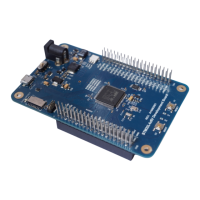USB on-the-go full-speed (OTG_FS) RM0351
1496/1693 DocID024597 Rev 3
• It includes full support (PHY) for the optional On-The-Go (OTG) protocol detailed in the
On-The-Go Supplement Rev 1.3 specification
– Integrated support for A-B Device Identification (ID line)
– Integrated support for host Negotiation Protocol (HNP) and Session Request
Protocol (SRP)
– It allows host to turn V
BUS
off to conserve battery power in OTG applications
– It supports OTG monitoring of V
BUS
levels with internal comparators
– It supports dynamic host-peripheral switch of role
• It is software-configurable to operate as:
– SRP capable USB FS Peripheral (B-device)
– SRP capable USB FS/LS host (A-device)
– USB On-The-Go Full-Speed Dual Role device
• It supports FS SOF and LS Keep-alives with
– SOF pulse PAD connectivity
– SOF pulse internal connection to timer (TIMx)
– Configurable framing period
– Configurable end of frame interrupt
• It includes power saving features such as system stop during USB Suspend, switch-off
of clock domains internal to the digital core, PHY and DFIFO power management
• It features a dedicated RAM of 1.25 Kbytes with advanced FIFO control:
– Configurable partitioning of RAM space into different FIFOs for flexible and
efficient use of RAM
– Each FIFO can hold multiple packets
– Dynamic memory allocation
– Configurable FIFO sizes that are not powers of 2 to allow the use of contiguous
memory locations
• It guarantees max USB bandwidth for up to one frame (1 ms) without system
intervention
• It supports charging port detection as described in Battery Charging Specification
Revision 1.2
• It supports Attach Detection Protocol (ADP)
43.2.2 Host-mode features
The OTG_FS interface main features and requirements in host-mode are the following:
• External charge pump for V
BUS
voltage generation.
• Up to 12 host channels (pipes): each channel is dynamically reconfigurable to allocate
any type of USB transfer.
• Built-in hardware scheduler holding:
– Up to 12 interrupt plus isochronous transfer requests in the periodic hardware
queue
– Up to 12 control plus bulk transfer requests in the non-periodic hardware queue
• Management of a shared Rx FIFO, a periodic Tx FIFO and a nonperiodic Tx FIFO for
efficient usage of the USB data RAM.

